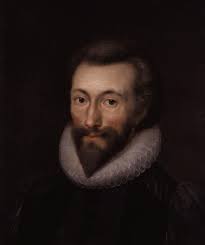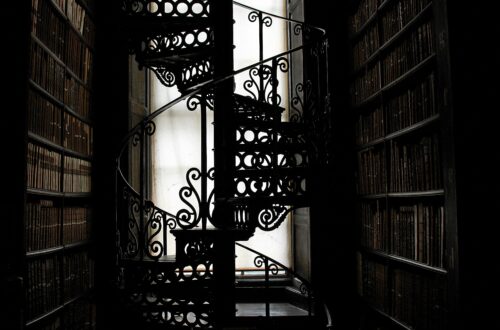For this week’s blog post, I’d thought I’d detour a bit into the art of writing. As a writer, I have an interest in writers and their skills with the written word, including poets of the past, and wanted to incorporate writers and poets into my blog posts.
John Donne is one of English literature’s most enigmatic and enduring voices. A poet-priest who explored the extremes of passion and piety, Donne’s work traverses erotic longing, existential dread, and divine transcendence. His legacy rests in his dazzling metaphysical conceits—those unexpected, often startling comparisons that stretch thought and language to their limits. Donne’s poetry challenges the reader to think and feel deeply, making him a cornerstone of early modern English verse.
A Brief Biography: The Turbulent Life of John Donne
Early Life and Education (1572–1596)
John Donne was born in London in 1572 to a devout Roman Catholic family during a time of Protestant rule in England. This background placed him in a precarious social position and would later influence the themes of spiritual struggle in his work. Donne attended Hart Hall, Oxford, and later the University of Cambridge, but as a Catholic, he was barred from taking a degree. He also studied law at Lincoln’s Inn, preparing for a secular career.
A Scandalous Marriage and a Struggle for Patronage (1597–1615)
Donne’s early adulthood was marked by travel, military service, and a reputation for clever, often erotic poetry circulated among courtly circles. His secret marriage in 1601 to Anne More, the 17-year-old niece of his employer, resulted in his brief imprisonment and a lasting blow to his career. The couple had twelve children, and Donne struggled financially for many years, depending on patrons and gifts.
Ordination and Later Years (1615–1631)
In a dramatic turn, Donne was ordained as an Anglican priest in 1615, at the urging of King James I. His sermons became as celebrated as his poetry for their intellectual richness and spiritual insight. Donne was eventually appointed Dean of St. Paul’s Cathedral in 1621. His later works, including the Holy Sonnets and his meditative prose, reflect a man confronting mortality, sin, and divine mercy with emotional and philosophical depth.
John Donne died on March 31, 1631, leaving behind a body of work that straddles the sacred and the profane, the cerebral and the deeply human.
Famous Poems and Lines by John Donne
1. “A Valediction: Forbidding Mourning”
Written to his wife before a long journey, this poem is a tender meditation on love that transcends physical presence. Donne famously compares their souls to the legs of a compass—always connected, always returning.
Famous Lines:
“Our two souls therefore, which are one,
Though I must go, endure not yet
A breach, but an expansion,
Like gold to airy thinness beat.”
“If they be two, they are two so
As stiff twin compasses are two;
Thy soul, the fixed foot, makes no show
To move, but doth, if the other do.”
2. “The Flea”
A witty and sensual poem in which Donne tries to seduce a woman by arguing that their blood has already mingled in a flea—so why not their bodies?
Famous Lines:
“It sucked me first, and now sucks thee,
And in this flea our two bloods mingled be.”
“This flea is you and I, and this
Our marriage-bed and marriage-temple is.”
3. “Death Be Not Proud” (Holy Sonnet X)
One of Donne’s most famous religious poems, this sonnet defies death itself, portraying it not as an end but as a powerless transition.
Famous Lines:
“Death, be not proud, though some have called thee
Mighty and dreadful, for thou art not so;”
“One short sleep past, we wake eternally,
And death shall be no more; Death, thou shalt die.”
4. “Meditation XVII” (from Devotions upon Emergent Occasions)
Though prose, this work contains one of Donne’s most enduring metaphors—highlighting the interconnectedness of humanity and the inevitability of death.
Famous Lines:
“No man is an island, entire of itself; every man is a piece of the continent, a part of the main.”
“Never send to know for whom the bell tolls; it tolls for thee.”
5. “Batter My Heart, Three-Person’d God” (Holy Sonnet XIV)
A desperate, almost violent plea for divine intervention, Donne begs God to take forceful control of his soul.
Famous Lines:
“Batter my heart, three-person’d God; for you
As yet but knock, breathe, shine, and seek to mend;
That I may rise and stand, o’erthrow me, and bend
Your force to break, blow, burn, and make me new.”
Themes and Legacy
Donne’s poetry blends sensual experience with intellectual rigor. His themes include:
• Love and Desire: Erotic yet spiritual, often uniting body and soul.
• Death and Mortality: Especially in later works, death is not to be feared but confronted with wit and faith.
• Religion and Redemption: A deeply conflicted believer, Donne’s religious poetry captures the anguish and ecstasy of faith.
• Metaphysical Conceit: Donne’s signature device—extravagant comparisons that make the abstract concrete (e.g., lovers as compasses, God as a besieging army).
Donne’s work fell out of favor during the Enlightenment but was revived by modernist poets like T. S. Eliot, who admired Donne’s ability to merge intellect and emotion. Today, Donne stands as a pillar of English metaphysical poetry, revered for both his dazzling wit and his spiritual candor.
Final Thoughts
John Donne was a poet of paradoxes—earthly and divine, romantic and reverent, rebellious and devout. His work captures the fullness of human experience with linguistic brilliance and emotional intensity. Whether meditating on death or whispering into a lover’s ear, Donne’s voice still resonates across centuries, inviting readers to embrace life in all its contradiction and glory. He understood that ‘no man was an island,’ our actions affect all those around us. His work is still available to purchase on Amazon and other book sellers.
——
“I am two fools, I know,
For loving, and for saying so
In whining poetry.”
— John Donne, “The Triple Fool”
Thanks for reading. For more blog posts, click here.
To read my short stories, click here.






One comment on “John Donne: The Metaphysical Master of Love, Death, and Divine Longing”